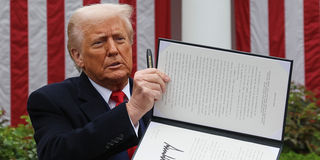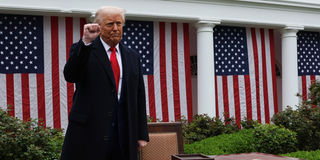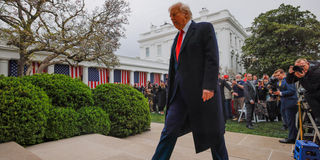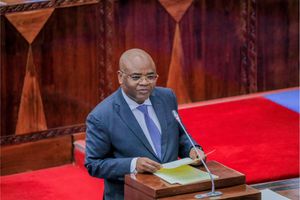World leaders react to Trump's tariffs

US President Donald Trump holds a signed executive order on tariffs, in the Rose Garden at the White House in Washington, DC, US, April 2, 2025.
What you need to know:
- US Treasury chief Scott Bessent urged other nations not to retaliate, moves that could lead to dramatically higher prices for consumers on everything from bicycles to wine.
President Donald Trump's decision to slap a 10 percent tariff on most goods imported to the United States, as well as higher duties on dozens of countries from rivals to allies, has intensified a global trade war that threatens to stoke inflation and stall growth.
The sweeping duties announced against the serene backdrop of the White House Rose Garden on Wednesday immediately unleashed turbulence across world markets and drew condemnation from other leaders now faced with the end of decades of trade liberalization that have shaped the global order.
As Asia awoke to the news on Thursday, Japan's Nikkei hit an eight-month low while US and European stock futures dropped sharply following weeks of volatile trading. US stocks have erased nearly $5 trillion (Sh640 trillion) of value since mid-February.
China, the world's second-largest economy, faced with a fresh 34 percent tariff on top of the 20 percent Trump previously imposed, urged the United States to immediately cancel its latest levies and vowed countermeasures.
US Treasury chief Scott Bessent urged other nations not to retaliate, moves that could lead to dramatically higher prices for consumers on everything from bicycles to wine. "If you retaliate, that’s how we get escalation," Bessent told CNN.
Sweeping tariffs announced
Close US allies were not spared Trump's ire, including the European Union, which faces a 20 percent tariff, and Japan, which is targeted for a 24 percent rate. Tokyo said it was leaving all options to respond to the "extremely regrettable" duties.
The base 10 percent tariffs go into effect on April 5 and the higher reciprocal rates on April 9.
The effective US import tax rate has shot to 22 percent under Trump from just 2.5 percent in 2024, according to the head of US research at Fitch Ratings.
"That rate was last seen around 1910," Olu Sonola said in a statement. "This is a game-changer, not only for the US economy but for the global economy. Many countries will likely end up in a recession. You can throw most forecasts out the door if this tariff rate stays on for an extended period of time."
The "reciprocal" tariffs, Trump said, were a response to duties and other non-tariff barriers put on US goods. He argued that the new levies will boost manufacturing jobs at home.
"For decades, our country has been looted, pillaged, raped and plundered by nations near and far, both friend and foe alike," Trump said.

US President Donald Trump gestures, after signing an executive order on tariffs, in the Rose Garden at the White House in Washington, DC, US, April 2, 2025.
Outside economists have warned that tariffs could slow the global economy, raise the risk of recession, and increase living costs for the average US family by thousands of dollars.
Canada and Mexico, the two largest US trading partners, already face 25 percent tariffs on many goods and will not face additional levies from Wednesday's announcement.
Even some fellow Republicans have expressed concern about Trump's aggressive trade policy.
Within hours of Wednesday's announcement, the Senate voted 51-48 to approve legislation that would terminate Trump's Canadian tariffs, with a handful of Republicans breaking with the president. Passage in the Republican-controlled US House of Representatives, however, was seen as unlikely.
Trump's top economist, Stephen Miran, told Fox Business on Wednesday the tariffs would work out well for the US in the long run, even if they cause some initial disruption.
"Are there going to be short-term bumps as a result? Absolutely," Miran, the chairman of Trump's Council of Economic Advisors, told the network's "Kudlow" program.
Ending 'De minimis'
The reciprocal tariffs do not apply to certain goods, including copper, pharmaceuticals, semiconductors, lumber, gold, energy and "certain minerals that are not available in the United States," according to a White House fact sheet.
Following his remarks, Trump also signed an order to close a trade loophole used to ship low-value packages - those valued at $800 (Sh102,481) or less - duty-free from China, known as "de minimis." The order covers goods from China and Hong Kong and will take effect on May 2, according to the White House, which said the move was intended to curb the flow of fentanyl into the U.S.
Chinese chemical makers are the top suppliers of raw materials purchased by Mexico's cartels to produce the deadly drug, U.S. anti-narcotics officials say. A Reuters investigation last year showed how traffickers often route these chemicals through the United States by exploiting the de minimis rule. China has repeatedly denied culpability.

US President Donald Trump walks on the day of his remarks on tariffs in the Rose Garden at the White House in Washington, DC, US, April 2, 2025.
Retaliation looms
Trump is also planning other tariffs targeting semiconductors, pharmaceuticals, and potentially critical minerals, the official said.
Trump's barrage of penalties has rattled financial markets and businesses that have relied on trading arrangements that have been in place since the middle of last century.
Earlier in the day, the administration said a separate set of tariffs on auto imports that Trump announced last week will take effect starting on Thursday.
Trump previously imposed 25 percent duties on steel and aluminum and extended them to nearly $150 billion (Sh19.2 trillion) worth of downstream products.
Tariff concerns have already slowed manufacturing activity across the globe, while also spurring sales of autos and other imported products as consumers rush to make purchases before prices rise.
European leaders reacted with dismay, saying a trade war would hurt consumers and benefit neither side.
"We will do everything we can to work towards an agreement with the United States, with the goal of avoiding a trade war that would inevitably weaken the West in favor of other global players," Italy's prime minister, Giorgia Meloni, said.
Political divide
US Representative Gregory Meeks, the top Democrat on the House Foreign Affairs Committee, said he would introduce legislation to end the tariffs. Such a bill has little chance of passing the Republican-controlled Congress, however.
"Trump just hit Americans with the largest regressive tax hike in modern history - massive tariffs on all imports. His reckless policies are not only crashing markets, they will disproportionately hurt working families," Meeks said.
Here are some reactions from top officials and governments around the world:
EUROPEAN COMMISSION PRESIDENT URSULA VON DER LEYEN
"President Trump's announcement of universal tariffs on the whole world, including the EU, is a major blow to the world economy."
"Uncertainty will spiral and trigger the rise of further protectionism. The consequences will be dire for millions of people around the globe."
"We are already finalising a first package of countermeasures in response to tariffs on steel. And we are now preparing for further countermeasures, to protect our interests and our businesses if negotiations fail."
CHINA COMMERCE MINISTRY
"China firmly opposes this and will take countermeasures to safeguard its own rights and interests."
"There are no winners in trade wars, and there is no way out for protectionism. China urges the U.S. to immediately lift unilateral tariffs and properly resolve differences with its trading partners through dialogue on an equal footing."
JAPANESE PRIME MINISTER SHIGERU ISHIBA
"Japan is a country that is making the largest amount of investment to the United States, so we wonder if it makes sense for (Washington) to apply uniform tariffs to all countries."
"We need to consider what's best for Japan's national interest. We're putting all options on the table in considering the most effective response."
CANADIAN PRIME MINISTER MARK CARNEY
"(Trump) has preserved a number of important elements of our relationship, the commercial relationship between Canada and the United States. But the fentanyl tariffs still remain in place, as do the tariffs for steel and aluminum."
"We are going to fight these tariffs with countermeasures, we are going to protect our workers, and we are going to build the strongest economy in the G7."
BRAZILIAN FOREIGN MINISTRY
"The Brazilian government regrets the decision made by the North American government today, April 2, to impose additional tariffs of no more than 10% on all Brazilian exports to that country."
"The Brazilian government is evaluating all possible actions to ensure reciprocity in bilateral trade, including resorting to the World Trade Organization, in defense of legitimate national interests."
AUSTRALIAN PRIME MINISTER ANTHONY ALBANESE
"The (Trump) administration's tariffs have no basis in logic and they go against the basis of our two nations' partnership. This is not the act of a friend. Today's decision will add to uncertainty in the global economy and it will push up costs for American households."
SOUTH KOREAN ACTING PRESIDENT HAN DUCK-SOO
"As the global trade war has become a reality, the government must pour all its capabilities to overcome the trade crisis."
NEW ZEALAND TRADE MINISTER TODD MCCLAY
"New Zealand's interests are best served in a world where trade flows freely ... New Zealand's bilateral relationship with the U.S. remains strong. We will be talking with the administration to get more information, and our exporters to better understand the impact this announcement will have."
SPANISH PRIME MINISTER PEDRO SANCHEZ
"Spain will protect its companies and workers and will continue to be committed to an open world."
SWEDISH PRIME MINISTER ULF KRISTERSSON
"We don't want growing trade barriers. We don't want a trade war ... We want to find our way back to a path of trade and cooperation together with the US, so that people in our countries can enjoy a better life."
SWISS PRESIDENT KARIN KELLER-SUTTER
"(The Federal Council) will quickly determine the next steps. The country's long-term economic interests are paramount. Adherence to international law and free trade remain core values."
IRISH PRIME MINISTER MICHEAL MARTIN
"The decision by the U.S. tonight to impose 20% tariffs on imports from across the European Union is deeply regrettable. I strongly believe that tariffs benefit no one. My priority, and that of the government, is to protect Irish jobs and the Irish economy."
ITALIAN PRIME MINISTER GIORGIA MELONI
"We will do everything we can to work towards an agreement with the United States, with the goal of avoiding a trade war that would inevitably weaken the West in favor of other global players."
MANFRED WEBER, PRESIDENT OF THE EPP, LARGEST PARTY IN EUROPEAN PARLIAMENT
"To our American friends, today isn't liberation day - it's resentment day. Donald Trump's tariffs don't defend fair trade; they attack it out of fear and hurt both sides of the Atlantic. Europe stands united, ready to defend its interests, and open to fair, firm talks."
COLOMBIAN PRESIDENT GUSTAVO PETRO
"We will only make U.S. imports more expensive if they take away our jobs. But we won't raise tariffs if their goods help create higher-value jobs."





